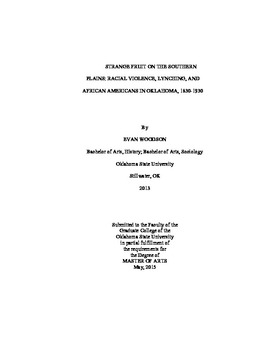| dc.contributor.advisor | Hughes, Charles | |
| dc.contributor.author | Woodson, Evan | |
| dc.date.accessioned | 2016-04-15T21:49:43Z | |
| dc.date.available | 2016-04-15T21:49:43Z | |
| dc.date.issued | 2015-05-01 | |
| dc.identifier.uri | https://hdl.handle.net/11244/33466 | |
| dc.description.abstract | To varying degrees, African-descended people in Oklahoma encountered racial violence in every era of history between 1830 and 1930. The first African-descended people to set foot in Oklahoma were those slaves who endured the Trail of Tears along with their Cherokee, Creek, Chickasaw, Choctaw, and Seminole masters. While there was a great deal of variance in racialized violence used in dealing with Black slaves between and within tribes, the system of Black chattel slavery practiced by a tiny minority of members of the Five Tribes was nonetheless predicated upon racial violence. The role of racial violence in the ensuing processes of emancipation, land allotment, and the granting of tribal citizenship to freedpeople further demonstrates the varying degree to which the different members of the Five Tribes understood themselves in relation to Whites and Blacks in Indian Territory. Having evolved from Western frontier justice in the territorial period to Southern racial control by the early years of statehood, racial violence � in the form of lynching � peaked in the 1910s. In conjunction with Jim Crow segregation, Whites sought to use lynching as a tool to shape the racial hierarchy of the new state. This decade of increased lynching and sharpened segregation culminated in the 1921 Tulsa Race Riot, the most wide-ranging and destructive example of White racial violence against African Americans in Oklahoma between 1830 and 1930. The massive loss of life and destruction of property that stemmed from the invasion of Greenwood is evidence of the power of lynching as a social and political force, as well as the unique nature of race relations in Oklahoma � a state which was purportedly more welcoming to Blacks than was the Old South. | |
| dc.format | application/pdf | |
| dc.language | en_US | |
| dc.publisher | Oklahoma State University | |
| dc.rights | Copyright is held by the author who has granted the Oklahoma State University Library the non-exclusive right to share this material in its institutional repository. Contact Digital Library Services at lib-dls@okstate.edu or 405-744-9161 for the permission policy on the use, reproduction or distribution of this material. | |
| dc.title | Strange Fruit on the Southern Plains: Racial Violence, Lynching, and African Americans in Oklahoma, 1830-1930 | |
| dc.type | text | |
| dc.contributor.committeeMember | Kinder, John | |
| dc.contributor.committeeMember | Carreiro, Amy | |
| osu.filename | Woodson_okstate_0664M_13959.pdf | |
| osu.accesstype | Open Access | |
| dc.description.department | History | |
| dc.type.genre | Thesis | |
